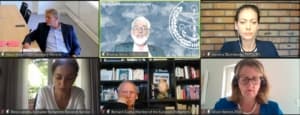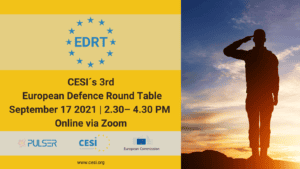2021-09-21 11:43
On its 3rd reunion of September 17th, 2021, the European Defence Round-Table gathered security experts to assess what is the future of the European Defence Union (EDU) following the Allies’ withdrawal from Afghanistan.
The last European Defence Round-Table (EDRT) has analyzed the efforts done by the European Union so far to develop a Common Security and Defence Policy (CSDP).
On its 3rd reunion of September 17th, 2021, it gathered security experts to assess what is the future of the European Defence Union (EDU) following the Allies’ withdrawal from Afghanistan.
All panelists underlined that if the EU wants to remain a credible and strong international actor it needs to step up its efforts in the field of defence.

Bernard Guetta, Member of the European Parliament and member of Committee on Foreign Affairs, stated the following: ‘We have to fight for our own values, for our own civilization, and for our own liberties. The threat is not only economical competition.’
Elena Lazarou (Head of Unit at the European Parliament Research Service) described the incontestable impact of the NATO withdrawal from Afghanistan on the future EDU. According to her, Europe needs enhanced intelligence cooperation in fighting common threats, adavanced interoperability, improved immediate capabilities and an early warning system for defence.
Dr Alison Weston, (Head of Division for Partnerships and Task Force NATO in the European External Action Service) emphasized the need to ‘start walking the walk and not talking the talk’. From her a lot has been achieved with the European Defence Union in a short time. But a lot remains to be done. She particularly stressed the need to focus on resilience, access to global commons and operational activities.
Thomas Sohst, representative of the ‘Deutscher Bunderwehrverband’ (Association of the German Army) and President of the CESI expert commission ‘Defence’, advocated for more political support and political responsibility: ‘Afghanistan did not work because the armed forces did not work. Afghanistan did not work because there was no overall concept, or because this overall concept did not work. The lessons we have learnt from Afghanistan should give us the courage to assume political responsibility in the field of foreign and security policy. A new construct is needed based on common political will.’
In its closing remarks Klaus Heeger, CESI Secretary-General, pleaded for ‘a new strategic framework with clearer objectives, strategies and tools for the EDU. (…) In order to gain more support, the CSDP will need more transparency, more inclusiveness. Especially the inclusion of those directly concerned by military missions. ‘
CESI will continue to advocate for the formal establishment of a European Defence Round-Table where all voices are heard and which builds bottom-up, based on the experience of military and civilian armed forces personnel.




 canva pro
canva pro